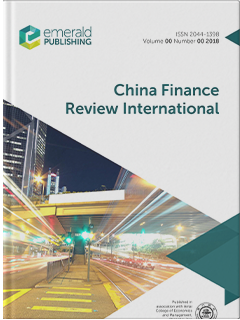Risk spillovers connectedness between the US Fintech industry VaR, behavioral biases and macroeconomic instability factors: COVID-19 implications
IF 7.6
1区 经济学
Q1 BUSINESS, FINANCE
引用次数: 4
Abstract
PurposeThe main objective of this paper is to analyze the dynamic volatility spillovers between the investor's behavioral biases, the macroeconomic instability factors and the value at risk of the US Fintech stock market before and during the COVID-19 pandemic.Design/methodology/approachThe authors used the methodologies proposed by Diebold and Yilmaz (2012) and the wavelet approach.FindingsThe wavelet coherence results show that during the COVID-19 period, there was a strong co-movement among value at risk and each selected variables in the medium-run and the long-run scales. Diebold and Yilmaz's (2012) method proved that the total connectedness index raised significantly during the COVID-19 period. Moreover, the overconfidence bias and the financial stress index are the net transmitters, while the value at risk and herding behavior variables are the net receivers.Research limitations/implicationsThis study offers some important implications for investors and policymakers to explain the impact of the COVID-19 pandemic on the risk of Fintech industry.Practical implicationsThe study findings might be useful for investors to better understand the time–frequency connectedness and the volatility spillover effects in the context of COVID-19 pandemic. Future research may deal with investors' ability of constructing portfolios with another alternative index like cryptocurrencies which seems to be a safer investment.Originality/valueTo the best of the authors' knowledge, this is the first study that relies on the continuous wavelet decomposition technique and spillover volatility to examine the connectedness between investor behavioral biases, uncertainty factors, and Value at Risk of US Fintech stock markets, while taking into account the recent COVID-19 pandemic.美国金融科技行业风险值、行为偏差和宏观经济不稳定因素之间的风险溢出联系:新冠肺炎影响
目的分析新冠肺炎疫情前后美国金融科技股票市场投资者行为偏差、宏观经济不稳定因素和风险价值之间的动态波动溢出。设计/方法论/方法论作者使用了Diebold和Yilmaz(2012)提出的方法论和小波方法。结果小波相干性结果表明,在新冠肺炎期间,风险值与中长期尺度上的每个选定变量之间存在强烈的协同运动。Diebold和Yilmaz(2012)的方法证明,在新冠肺炎期间,总连通性指数显著提高。此外,过度自信偏差和财务压力指数是净发送器,而风险价值和羊群行为变量是净接收器。研究局限性/含义本研究为投资者和政策制定者解释新冠肺炎疫情对金融科技行业风险的影响提供了一些重要意义。实际含义研究结果可能有助于投资者更好地理解新冠肺炎大流行背景下的时频关联性和波动溢出效应。未来的研究可能会涉及投资者用加密货币等另一种替代指数构建投资组合的能力,这似乎是一种更安全的投资。原创/价值据作者所知,这是第一项依靠连续小波分解技术和溢出波动性来检验美国金融科技股票市场投资者行为偏见、不确定性因素和风险价值之间联系的研究,同时考虑到最近的新冠肺炎疫情。
本文章由计算机程序翻译,如有差异,请以英文原文为准。
求助全文
约1分钟内获得全文
求助全文
来源期刊

China Finance Review International
BUSINESS, FINANCE-
CiteScore
12.40
自引率
1.20%
发文量
112
期刊介绍:
China Finance Review International publishes original and high-quality theoretical and empirical articles focusing on financial and economic issues arising from China's reform, opening-up, economic development, and system transformation. The journal serves as a platform for exchange between Chinese finance scholars and international financial economists, covering a wide range of topics including monetary policy, banking, international trade and finance, corporate finance, asset pricing, market microstructure, corporate governance, incentive studies, fiscal policy, public management, and state-owned enterprise reform.
 求助内容:
求助内容: 应助结果提醒方式:
应助结果提醒方式:


